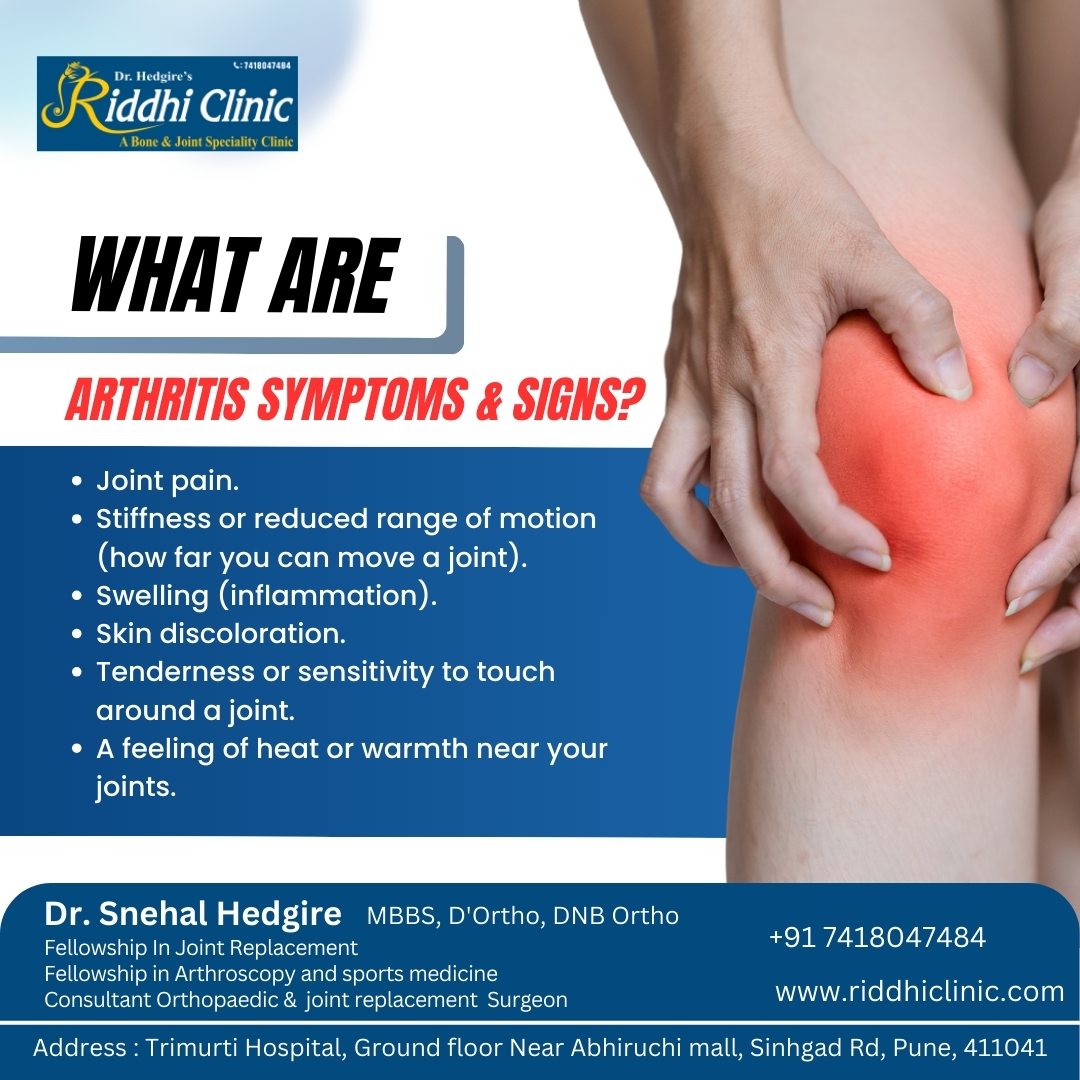Arthritis is a common condition that affects millions of people worldwide. It refers to inflammation in the joints, leading to pain, stiffness, and swelling. It’s important to recognize the early signs and symptoms of arthritis so that you can seek appropriate treatment. At Riddhi Clinic, Dr. Snehal Hedgire, an experienced orthopedic surgeon, specializes in diagnosing and treating various forms of arthritis. Here’s what you should know about the symptoms and signs of this condition.
What is Arthritis?
Arthritis is a group of diseases that cause inflammation in the joints. There are many types of arthritis, with Osteoarthritis (OA) and Rheumatoid Arthritis (RA) being the most common. While each type of arthritis has its unique characteristics, they share some common symptoms that can affect your day-to-day activities.
Common Symptoms and Signs of Arthritis
- Joint Pain
- One of the most noticeable signs of arthritis is joint pain. This pain can range from mild discomfort to severe, debilitating pain that makes it difficult to move the joint.
- In osteoarthritis, pain typically worsens with activity and improves with rest. In rheumatoid arthritis, pain may come and go, often flaring up in the morning or after periods of inactivity.
- Stiffness
- Joint stiffness is another hallmark of arthritis, especially in the morning or after long periods of rest. The stiffness can last from a few minutes to several hours, depending on the type of arthritis and its severity.
- In rheumatoid arthritis, stiffness is typically more pronounced in the morning, while in osteoarthritis, it may worsen with activity and wear.
- Swelling and Inflammation
- Swollen joints are often a clear sign of arthritis. This is due to inflammation in the affected joint. Swelling can occur gradually over time or suddenly during an arthritis flare-up.
- In rheumatoid arthritis, inflammation can affect multiple joints, whereas in osteoarthritis, it typically affects one joint at a time.
- Redness and Warmth
- When a joint becomes inflamed due to arthritis, it can appear red and feel warm to the touch. This is a sign of increased blood flow and inflammation in the joint area.
- Decreased Range of Motion
- As arthritis progresses, the affected joints may lose their flexibility. This can limit your ability to move the joint as freely as before. For example, you might find it difficult to straighten your knee or bend your fingers.
- Fatigue
- Arthritis, especially rheumatoid arthritis, can lead to systemic symptoms such as fatigue. Chronic inflammation and pain can drain your energy, leaving you feeling tired even after a good night’s rest.
- Grating or Popping Sensations
- People with osteoarthritis may feel a grating or popping sensation when moving a joint. This happens due to the wear and tear of cartilage, which causes the bones to rub against each other.
- Nodules (Rheumatoid Arthritis)
- Rheumatoid arthritis can cause the formation of lumps or nodules under the skin, often near the affected joints. These are known as rheumatoid nodules and are a characteristic feature of RA.
When to See a Doctor?
If you experience any of the above symptoms, it’s important to consult with an orthopedic specialist like Dr. Snehal Hedgire at Riddhi Clinic. Early diagnosis and intervention can help manage symptoms, slow down disease progression, and improve your quality of life. Additionally, seeking medical advice can help rule out other conditions that may cause similar symptoms, such as tendonitis or bursitis.
Conclusion
Arthritis symptoms can range from mild to severe, affecting your joints and overall health. If you are experiencing pain, stiffness, swelling, or any other signs of arthritis, don’t ignore them. Early treatment is key to managing arthritis and preventing further joint damage. Dr. Snehal Hedgire at Riddhi Clinic is here to help you with a personalized treatment plan to address your arthritis symptoms effectively.











